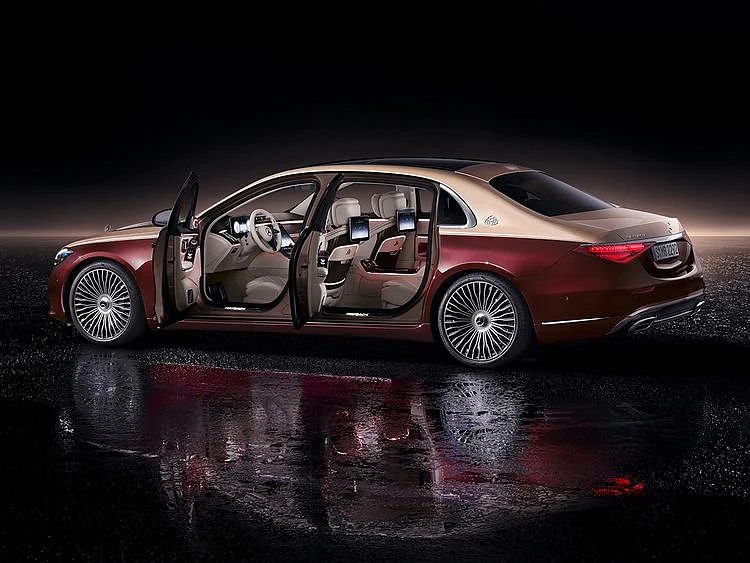Mercedes-Benz AG will cut back its entry-level suite of cars as part of a strategic overhaul that will channel more than three-quarters of the carmaker's investment to its higher-end vehicles.
Mercedes unveiled its plans to major investors on Thursday, placing the drive for greater profitability on its so-called Top End Vehicle segment, home to the iconic G-Wagon, the flagship S-Class sedan and the high-performance AMG division.
"We are further sharpening the focus of our business model and product portfolio in order to maximize the potential of Mercedes-Benz even in challenging conditions," Chief Executive Officer Ola Kallenius said in a statement. "At the heart of that is our goal to build the world's most desirable cars."
The strategy builds on a trend that pushed profitability to record levels during the semiconductor crunch, but the jury is out on whether it would be as effective if supply constraints ease and automakers return to chasing market share. While Mercedes sold 10 per cent fewer vehicles in the first quarter compared to a year ago, profit surged 20 per cent.
Mercedes sees top-end vehicle sales increasing by 60 per cent by 2026, a jump that would help push its operating margin to around 14 per cent by mid-decade, the company said. But the carmaker acknowledged that headwinds including raw-material prices, supply-chain bottlenecks and broader economic risks pose a threat to the targets.
Variants for entry level models like the A-Class will be cut to four from seven, the company said. Mercedes currently produces numerous entry level variants, including estate and sports utility vehicle models.
Mercedes will launch its next car operating system on an entry-level compact car and brand them as flagships for affluent, tech-savvy buyers.
"We are not chasing volume," Mercedes-Benz Chief Financial Officer Harald Wilhelm said on a call with reporters. "This is entry luxury."
Mercedes is also starting a Mythos brand of collectable vehicles aimed at marketing exclusivity. Mercedes gave a teaser of the first Mythos car - a speedster based on the new Mercedes-AMG SL - and suggested it could become a rival to cars such as Ferrari NV's limited-edition Icona series.
The automaker will unveil a prototype car based on its future electric AMG platform later Thursday. Famous for its roaring V8 engines, the division faces a challenge in convincing performance-car enthusiasts to switch to all-electric models.
"We see great potential here to expand our top-end portfolio with even more fascinating products for our customers," Kallenius said.
After the successful separation of Mercedes and its sprawling truck division, management is intensifying efforts to transform the inventor of the automobile to compete with Tesla Inc. The company aims to have battery-powered models in all its segments this year, a staging post for its ambition to sell only electric cars by 2030.
While the carmaker is Europe's most valuable company brand, according to consultancy Interbrand, Tesla boasts a market capitalisation ten times greater than the Stuttgart, Germany-based firm. And Volkswagen AG's Porsche sports-car unit would command a valuation of about 95 billion euros ($100 billion) should a planned share sale go ahead, according to Bloomberg Intelligence. That compares to Mercedes at about 74 billion.
But some analysts warn that the push toward more profitable luxury vehicles may be misguided.
"The high margins of car manufacturers are not sustainable and will fall again significantly when the car market returns to normal," Nord/LB analyst Frank Schwope said in an email.
Achieving a higher return would help Mercedes finance the expensive shift to electric vehicles and digital car technology.
But there are risks as global economic forecasts deteriorate, potentially undermining projections by BCG Consultancy that sees growth in the luxury-car segment three times faster than that for normal vehicles.
"The premium car-maker from Stuttgart has a simple plan: make fewer small cars and make more large cars," said Bernstein analyst Daniel Roeska, who sees a 30% upside to the company's current share price of around 65 euros. By 2025, the average price for a car may rise to more than 85,000 euros from 70,000 euros in 2021, he said.
Sign up for the Daily Briefing
Get the latest news and updates straight to your inbox
Network Links
GN StoreDownload our app
© Al Nisr Publishing LLC 2026. All rights reserved.
